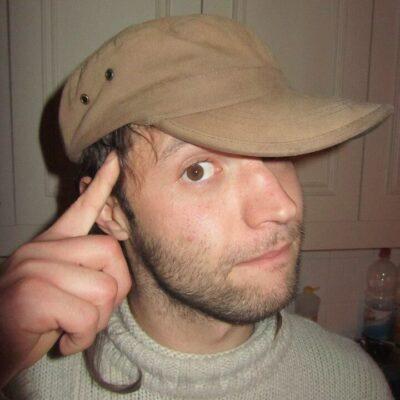It was bang on midnight, and the airport corridors weren’t that busy. Still, given the insufficient number of clerks, a long queue had formed before the foreign-passports immigration control booths. Peeping around at people and their documents to while away the wait, I noticed the queue principally consisted of whom I call party Gulfers: affluent Gulf Arabs in Western garments visiting Lebanon to savor forbidden pleasures. The girls flaunted lustrous, unveiled hairdos and excessive maquillage. The guys were already online scrolling through profiles of Lebanese gals on dating apps.
Half an hour of zigzagging later, I was handing my passport to that frisky-looking officer through the slot of the service window. He glanced up and down a few times between the current, well-groomed version of myself and the earlier, shaggy one depicted on my passport. “You must shave this picture,” he concluded in broken English and with a slight grin.
Next, he asked for my (in reality, nonexistent) profession. I hesitated for a jiffy. In the past, I had been saying freelancer. But during a recent trip to a notorious dictatorship, this answer had caused significant confusion and delay. So I had figured that I must revise it to something simpler. Now I dithered as I tried to remember what that was. “Cook,” came soon the spontaneous reply.
Last, he wanted my address in Lebanon. This time, I told him the truth: “I don’t know.” I explained that my girlfriend had booked an Airbnb; I don’t have the details on my phone; she’s outside waiting for me, arrived earlier on a separate flight; and I don’t have internet to contact her. “Alright, remember next time,” he said in resignation and let me enter the territory of Lebanon.
In the arrivals hall, I bumped straight into Sophie—my aforementioned girlfriend, who would join me for the first half of this trip—and we began looking for a taxi.
Of course, the drivers were looking for us more actively and found us first. After a minute of parallel negotiations with the gang of them that rallied around us, we lowered the initial ripoff to an acceptable fare. And we followed the guy who offered it away from the airport to his jalopy of a pirate taxi.
Thanks to the late hour, Beirut’s freeways were free of congestion. It took little longer than smoking a cigarette to reach our destination. Incidentally, I asked the driver if I could smoke in his car; although I could have guessed it, I didn’t yet know that it’s customary for the Lebanese to smoke in all kinds of public transport and buildings.
According to the instructions, we walked into an unlit alley, climbed five flights of winding stairs to the top floor of an elevator-less condo, and knocked on the wooden door. Seconds later, our host, Tarek, appeared at the threshold wearing a warm welcoming smile.
With his long, black, curly hair and beard, as well as his prominent nose, he reminded me of the sort of character who would play a Babylonian king in a period film. His English was excellent and his disposition friendly. Alongside him, a young French girl, another Airbnb guest, was present. Having finished showing us around the apartment, he said: “We are going out now to a techno party. Are you guys tired?”
We were tired; awake and on the move since dawn. Until a moment earlier, we were longing for nothing but bed. But then he mentioned that such a party happens only once per month. Coincidences have a purpose. We asked them to wait for a minute while we got ready.
This story is an excerpt from my book "Backpacking Lebanon", wherein I recount my one-month journey around this fascinating country. Check it out if you like what you're reading.
We drove around a few blocks and parked in front of an unassuming, multi-story building on a narrow bystreet. I was expecting a club, but to my pleasant surprise, it looked like a squat. Tarek explained it wasn’t occupied, but his friends’ group had somehow gotten legal hold of it and used it as an alternative culture and activism center.
The bar and stage were on the first floor. Before the party began, we grabbed beers and went on a tour of the upper floors. They comprised a library, an art studio, and a collective kitchen. After a quick nosh at the latter, we sat in a room together with several of Tarek’s mates and smoked a couple of joints over interesting conversations. Although a techno party was held, the only other available substance was ketamine, which I was never fond of. So we stuck to booze and pot.
We headed back downstairs when the first notes reverberated through the floor. There we saw three dudes sound-checking a drum set, an electric guitar, and a flute. There would be a live gig before the DJ took over. Nice. We found a suitable spot and settled in to enjoy.
As the soundcheck continued without them tweaking anything, I assumed they were doing a somewhat over-protracted, dissonant sonic prelude for an intro before kicking off the actual performance. But as it dragged on and on, I realized that this very dissonance was the actual performance. It wasn’t only lacking rhythm and harmony, but even tempo. Each one played by himself and at complete random. Honestly, I don’t want to be mean, but the result couldn’t be any worse if you replaced them with a randomness generator program.
An hour of headache later, they left the stage to the DJ. It was an improvement. The machine could at least keep a consistent tempo. Still, that was the sole musical element involved in that booming cacophony of horrendous mixing. The headache intensified into a migraine and the accumulated tiredness kicked in like a sweeping avalanche. It was time to find Tarek to help us call a taxi home.
The taxi stopped across the street, and we got straight in. The apathetic man in the driver’s seat confirmed it was we who had placed the order and asked: “Where?”
With a tinge of confounded frustration, I pointed at the address on the screen of the mobile phone that was attached to the windshield right before his eyes and answered: “There.”
“Far,” he remarked. “Seven hundred.”
“No,” I said and now pointed at the price that read 240.
“Okay, how much you give?” he persisted.
“Two-forty,” I asserted with finality.
He shook his head in refusal, and we exited the car. This was the first of many similar experiences going forward.
Once more, we located Tarek in the crowd. He called another taxi and followed us out to ensure they wouldn’t try to scam us again.
In the wee hours, we collapsed on our floor mattress for a sound sleep.
We got up not long before noon. The harsh heat enveloped me like a fiery embrace as soon as I stepped out onto the balcony for my morning coffee.
For lack of view other than of the adjacent blocks, the first thing I noticed was that bullet marks and mortar holes riddled virtually all walls within sight. I would soon discover that such urban scars were rife throughout the city, a testament to the intensity of warfare it had endured.
We didn’t have big plans for our first day in Lebanon, except for chilling and a bit of sightseeing. Our only chores were to exchange some money and get a SIM card.
The first one was easy. Tarek directed us to an electronics shop around the corner for the most favorable rate. If this sounds like an improbable place to convert currency, here’s the background:
As a desperate measure to stabilize the economy during the crisis, the government imposed an artificially inflated rate for the Lebanese pound. At the time of our trip, this was about six times higher than the informal, realistic rate adopted by the organic economy. This meant that by buying local currency at an official exchange bureau or by using a foreign card to either withdraw cash from an ATM or make purchases denominated in Lebanese pounds, we’d end up paying six times more for everything.
We later figured out that there wasn’t a point to exchange money in the first place, since everyone, even in the remotest villages, happily accepted dollars. The rate at the electronics shop was a tad better, but factoring in the storage and transport hassle—$500 gave us a pack of 100,000-pound notes the size of two bricks that occupied a considerable part of my precious backpack space—it wasn’t worth it. Anyhow, in a frivolous, vainglorious way, it felt nice being a millionaire for a while.
As for the SIM card, it should be a matter of time until we come across some mobile network operator’s shop; these are ubiquitous in all cities worldwide. With that in mind, we began walking and exploring Beirut.
We stayed in Rmeil: a Greek Orthodox Christian district of eastern Beirut, renowned as an artistic hub. Meandering along its narrow, sloping, quiet streets, we saw churches and quaint old houses. Little effigies of the Virgin Mary and contemporary murals often adorned the latter’s yards and walls. Down a charming stair street, we stopped for lunch at a nice cafe Sophie had found in advance. We settled at a typical-of-Arabic-cafes, petite table, in the relieving shade of a tree, and enjoyed a delicious, cold vegetarian meal so befitting to the heat.
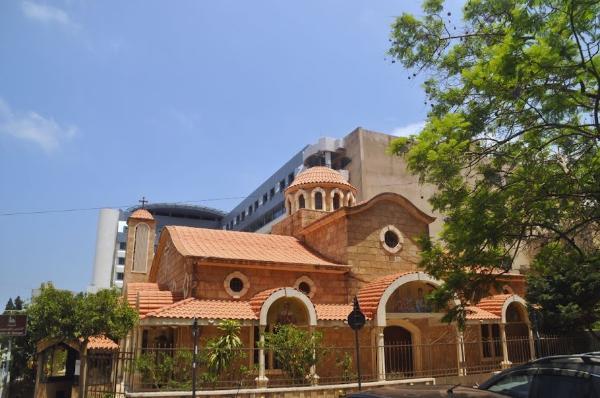
Resuming our walk, we followed Gouraud Street toward the center. This is one of Beirut’s principal nightlife streets. Even though it was early afternoon, many of the bars were already open and hosted companies of young locals sipping at pints.
It led us straight to the heart of the city, where we glanced at various interesting sights: the impressive Mohammad Al-Amin Mosque with its turquoise dome and towering minarets; the Martyrs’ Square with its power-inspiring Martyrs’ Monument in its middle; Medieval churches and Roman ruins.
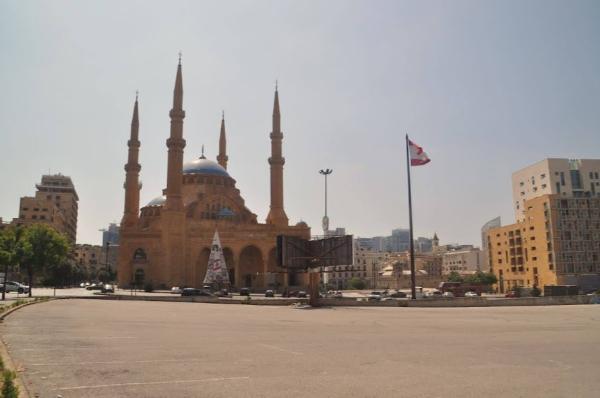
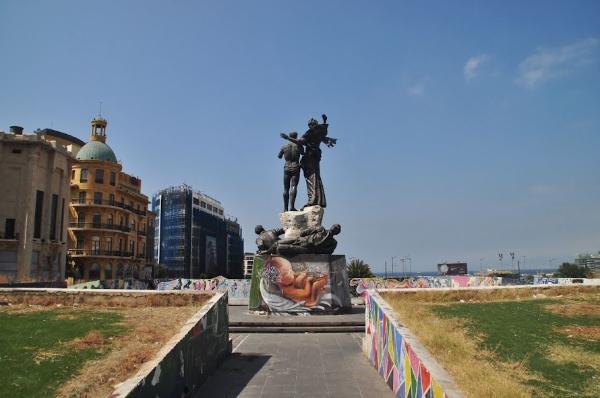
Most appealing, I found the Beirut Central District, with its broad cobbled streets radiating outward from the prominent clock tower in the center of Nejmeh Square. This part of the city was obliterated during the Civil War and reconstructed. Upon our visit, all entrances were guarded by stringent military checkpoints, all shops shut, and the streets vacant save us, a couple more tourists, and patrolling soldiers. The parliament, situated within the district, might have been meeting; hence the increased security measures.
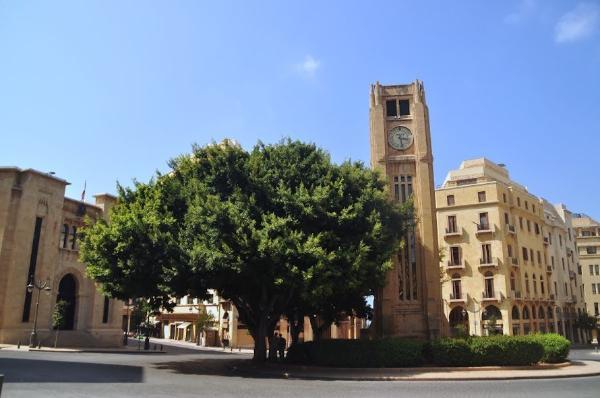
As the sun lowered, and the need for shade diminished, we paced toward the sea. We reached it at a posh waterfront known as Zaitunay Bay. It felt like a different city there—a wealthy enclave oblivious to the troubles of the surrounding millions. Ritzy apartment towers, swimming pool resorts, and swanky restaurants lined the continental side of the neat, crescentic boardwalk. Yachts and sailboats docked along the many wharves on the littoral side. Evidently disappointing the waiter with the size of our order, we had an overpriced, refreshing lemonade at the least-swanky of the restaurants and carried on along the coast.
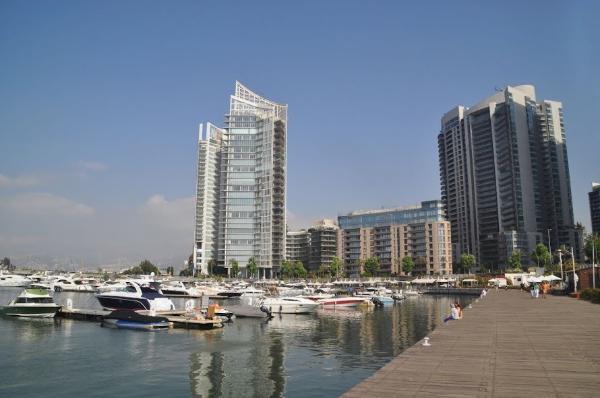
A 5-km-long promenade, called the Corniche, defined the entirety of central Beirut’s northern coastline. With the sun approaching the marine horizon, warm tints saturated the scenery. Retro street lamps and svelte, often bullet-marked palm trees arrayed the whole seafront, and people crowded it.
Big families strolled, guffawing kids racing ahead on bicycles and toy cars. Push cart vendors meandered through the mass, touting anything from balloons to falafel. Companies of young men occupied every bench, chattering and passing around wafting mouthpieces of shishas, while others dove into the sea from the rocks below the embankment. Solitary fishermen waited over their lined-up-along-the-railing rods.
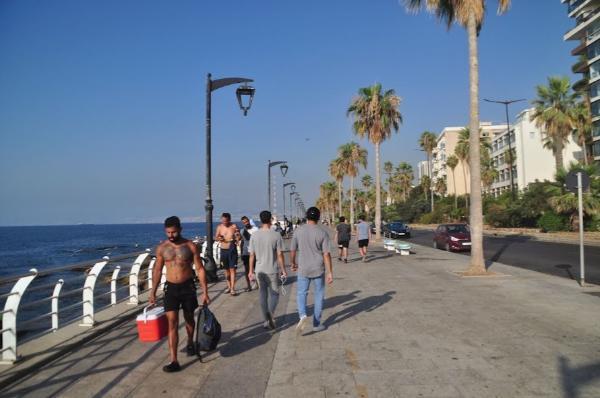
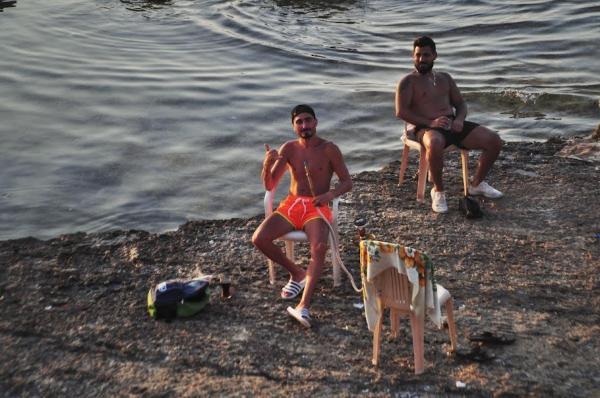
Identified by our cameras as overt tourists, we attracted a lot of attention. People greeted us with cordial gestures and smiles. Many stopped us for an affable chat or a picture request.
It was golden hour when we made it to that lighthouse on the rugged westernmost tip of Beirut, where we intended to find a secluded spot to smoke the last spliff from yesterday’s party and marvel at the sunset in peace. However, this plan proved unfeasible because military facilities and private resorts occupied the whole cape area. Alternatively, we settled on a filthy stairway across the main road, in the company of a clowder of cats, where we smoked and watched the sun setting over the trees and the traffic instead of the horizon.
As night fell, we headed back to the center, intent on dining on Hamra Street. This was presumably one of the city’s liveliest streets. But—perhaps because we wound up in the wrong part along its great length—we found it deserted and dreary. We only spotted a half-lit, rundown shawarma joint for a quick grab before taking a cab home.
Meanwhile, after some 30–40 km we walked all over the city throughout the day, we didn’t see any mobile operator’s shop. They sold SIM cards in different shops, but for a 500% markup compared to the original source. So we had to postpone this task for the next day.
The next day was a Sunday. As my tracking of the calendar isn’t in general much more regular than my tracking of Pluto’s position, I only realized the fact upon checking Google Maps for the SIM card shops to find out they were closed. So was the camping gear shop, where we needed to buy some stuff for our imminent outdoor adventure.
Our original plan was to leave Beirut early tomorrow morning. Our new plan became to go shopping early tomorrow morning and hopefully be gone before noon. As for the current Sunday, it could be our uneventful day off.
We didn’t leave the neighborhood for the whole day and we only left the apartment for food. For lunch, we went to a quirky, hipstery garden cafe where we had a delicious though downscaled shakshouka and nursed coffee a trickle at a time to lengthen our indolence in its pleasant ambiance. For dinner, we went to an upscale, traditional Lebanese restaurant on Gouraud Street where we paid the equivalent of a week’s ordinary alimentation but had the feast of the year. That I had to walk an extra route home and back because the money bundle I had with me turned out half an inch thinner than the bill was annoying, but it aided my digestion.
We were out before 8 am, motivated to complete our preparations swiftly and leave the city. But the city did not cooperate. To start, the nearby mall wouldn’t open until 10 o’clock.
After a wait over coffee, we were the first ones to enter and quick to locate the outdoors shop on the top level. We bought everything we needed—most essentially, a pair of long trekking pants for myself and a 10-liter, foldable water pouch—except some spare carabiners that, among quite a variety of climbing gear, they strangely didn’t have. Fortunately, on this trip, we’d need these only for hanging stuff from ourselves and not ourselves from cliffs. So we made do with the two we already had—and later with the one left after the other broke—without fatal complications. Only the bloody SIM was pending now.
We had expected there would be a cellular service provider’s store in the mall. Wrongly. For some reason, such stores were rare in this city. The nearest one was a half hour’s drive away in the Monday morning traffic.
Exiting the non-air-conditioned mobile oven of a taxi yielded no relief. An enormous queue—common to public-sector offices but outright aberrant for a non-monopolistic private enterprise—had formed between the direct, relentless solar radiation and the glass storefront. The constant flux of slicksters, who often successfully pestered the security guard to let them skip the line, aggravated the situation and my nerves. I must have sweated a jug during the two hours it took till we got in.
Another hour of seated and cooled-down waiting passed comfortably inside. And one more hour of procedure at the desk later, at last, we had internet. The taxi fares had doubled the cost of the card, but that was still better than the quintuple offer of the unofficial shops.
The downside was that we’d wasted the day. It was late afternoon when we wrapped up, behind time to go anywhere today, but at least completely ready to set off on our yearned-for journey first thing in the morning.
Photos
View (and if you want use) all my photographs from Beirut.
Accommodation and Activities in Lebanon
Affiliation disclosure: By purchasing goods or services via the links contained in this post, I may be earning a small commission from the seller's profit, without you being charged any extra penny. You will be thus greatly helping me to maintain and keep enriching this website. Thanks!
Stay22 is a handy tool that lets you search for and compare stays and experiences across multiple platforms on the same neat, interactive map. Hover over the listings to see the details. Click on the top-right settings icon to adjust your preferences; switch between hotels, experiences, or restaurants; and activate clever map overlays displaying information like transit lines or concentrations of sights. Click on the Show List button for the listings to appear in a list format. Booking via this map, I will be earning a small cut of the platform's profit without you being charged any extra penny. You will be thus greatly helping me to maintain and keep enriching this website. Thanks!
